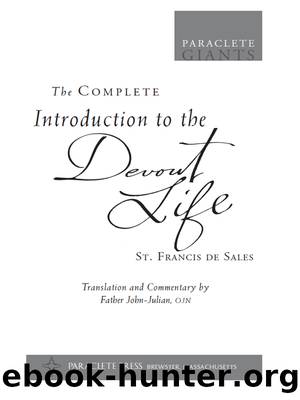The Complete Introduction to the Devout Life by Fr. John-Julian OJN

Author:Fr. John-Julian, OJN
Language: eng
Format: epub
Publisher: Paraclete Press
Published: 2013-01-15T00:00:00+00:00
PART III. CHAPTER 15.
How One Ought to Practice Poverty, Although Truly Rich
The artist Parrhasius painted the Athenian people by a very ingenious means, representing their divers and variable naturesâangry, unjust, inconstant, courteous, gentle, merciful, haughty, proud, humble, brash, and timidâall of these together.f But myself, dear child, I wish to put in your heart both richness and poverty, both a great care and a great contempt for temporal things.
a. Francis expands on the idea that we are mere caretakers of our belongings that have been given to us by Godâand, therefore, we have a responsibility to make our property âproductive and fruitful.â This is basically the same principle of stewardship we see applied in our day by those who call for responsible management of ecosystems, the environment, and the health of the planet.
b. An interesting logic that both justifies and lauds the actual increase of oneâs worldly goods as the fulfillment of Godâs will in giving those goods into oneâs care. [There is a reminder of the Parable of the Talents (Matt. 25:14â30 and Lk. 19:12â27), in which the master goes away and entrusts his money to his servants, and on his return rewards the servants who return the money with interest.]
c. So far it almost seems as though Francis is making the case for and generously approving what is basically a market capitalist concept of the management of property and wealth. At this point, however, there seems to be a full turnabout and from here on Francis defends without qualification the concept of the Common Good and the responsibility of the well-to-do to support and assist the poorâwith special high caution against confusing oneâs self-interest with the will of God.
d. Francis uniquely describes the loss of almsgiving as âholy and richââit is a strong image of âglorious povertyâ on the part of the almsgiver (which poverty will be rewarded richly by God).
e. Hosea 9:10b: ââ¦[The Israelites] alienated themselves in confusion and became abominable, as those were that they loved.â This is a peculiar reverse of the biblical principle: in Hosea, the Israelites became as abominable as the things they love. Francisâs point is that if we love the poor, we will become like the poor. Francis could have added: âBe careful what you love, for you will become like that yourself.â
f. In his translation Ryan declares this âa Pythagorean maxim,â but I believe it is original with Francis, who uses it also in another writing of his: On the Preacher and Preaching.
g. 2 Corinthians 11:29a: âWho is weak and I am not weak?â
h. Deuteronomy 15:11: âThere will not be poor in the land of your habitation: therefore I command you to open your hand to your needy and poor brother, that lives in the land.â
Download
This site does not store any files on its server. We only index and link to content provided by other sites. Please contact the content providers to delete copyright contents if any and email us, we'll remove relevant links or contents immediately.
Resisting Happiness by Matthew Kelly(3337)
The Social Psychology of Inequality by Unknown(3014)
Day by Elie Wiesel(2779)
Designing Your Life by Bill Burnett(2738)
The Giving Tree by Shel Silverstein(2336)
Human Design by Chetan Parkyn(2068)
The Supreme Gift by Paulo Coelho(1961)
Angels of God: The Bible, the Church and the Heavenly Hosts by Mike Aquilina(1953)
Jesus of Nazareth by Joseph Ratzinger(1802)
Hostage to the Devil by Malachi Martin(1800)
Augustine: Conversions to Confessions by Robin Lane Fox(1766)
7 Secrets of Divine Mercy by Vinny Flynn(1732)
Dark Mysteries of the Vatican by H. Paul Jeffers(1704)
The Vatican Pimpernel by Brian Fleming(1698)
St. Thomas Aquinas by G. K. Chesterton(1631)
Saints & Angels by Doreen Virtue(1603)
The Ratline by Philippe Sands(1568)
My Daily Catholic Bible, NABRE by Thigpen Edited by Dr. Paul(1486)
Called to Life by Jacques Philippe(1475)
